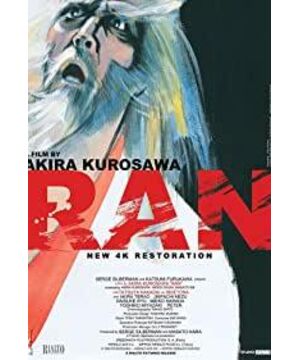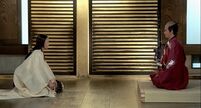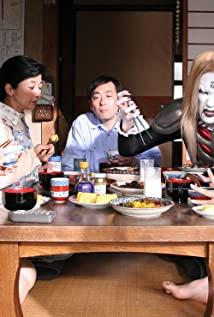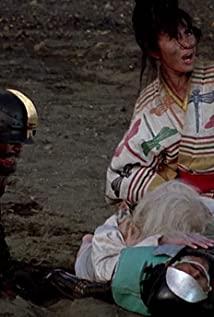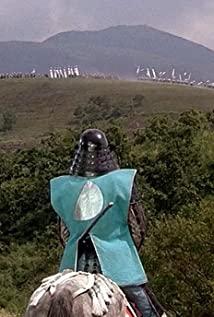The picture is excellent and impeccable, and that alone is enough to give it four stars. But as someone commented, there was no heart shock. The reason for this is that I already know that this is the story of "King Lear" and that everyone will die in the end. Without a suspenseful story, the audience has to look elsewhere.
A school of scholars represented by my boss disliked "King Lear", believing that its feelings were not revealed naturally, that it was too pretentious, and that it all relied on language to tease the audience's sympathy. "Chaos" probably echoes this school of scholars, removing the self-pity and self-love of a character Xiuhu. Unexpectedly, this is where "King Lear" shines. After removing it, it became a mediocre story.
Let's talk about the failure brought about by the transformation of the
script: the plot setting of the script itself is not realistic - the real people are much calmer than the old king in the play. We know that the elderly are often hot-headed, and many family disputes stem from this. But as far as "Chaos" is concerned, Yiwen Xiuhu seems to have become confused overnight, which is a bit sudden and even more unreasonable than "King Lear".
Not just unreasonable questions. Once he becomes confused, can he still show the power and happiness of the past? There are too few plots as a comparison between the past and the present. Not only did his image of a strong man not enter the audience's mind, but even the original relationship between father and son was hardly mentioned. This will naturally damage the audience's sense of identity, allowing the audience to stand outside Pharaoh's heart. (The "Paris, Texas" I watched yesterday is a good way to use home video to express the past. Scripts can be expressed in words, even dramas. However, as a medium that mainly uses pictures to speak, and then use words to express the film, it seems Stupid.)
Another setting of this film that detracts from the sense of identity is that Yiwen Xiuhu has killed too many people and owed too much debt. As a result, his experience is indeed destined by God as stated in the play, and the audience feels a little ashamed to love and pity him, and more is to feel the rotation of fate (from family to philosophy, the great truth of the universe). This is not the same as what most intimidates ordinary audiences in "King Lear" - family disputes, pension concerns. Because of this change in theme, King Lear's final climax in The Tempest was also replaced, and it became a death in the middle scene, highlighting the insignificance of human destiny in the environment, further weakening the sense of identity.
The film doesn't seem to take identity seriously: it doesn't focus on portraying the hearts of the characters. The large number of monologues in the play (not theatrical performance) directly makes the reader identify with King Lear. Compared with the text, the film is in the third person, and it is more difficult to obtain the audience's approval. In addition, the film depicts the war scenes in great detail, which makes the audience amazed and at the same time forgets the personal situation of King Lear.
On the other hand, there are also many failures in the film's adherence to Shakespeare's drama.
"Chaos" is always creating a dramatic scene, trying to reproduce the face of the drama. For example, the set, which is abrupt, weird, large color blocks, sharp contrast, and even some expressionism, all hint at the state of mind of the characters. The exaggerated movements of the characters, especially Lao Wang's, are too dramatic: he's crazy, but few madmen are so majestic. But at the same time, other characters (except Feng) use natural acting methods, so the film is not harmonious enough.
Although Japan has a similar tradition, the image of the clown-actor is almost unnecessary. In retrospect, did he play a role in softening King Lear's emotions? no. The director just relies on him to say some big truths, and these truths seem to be too straightforward.
(Theatrical and film have their own strengths - of course the film has more strengths, and as the film matures, the only remaining strength of the theater is the interactivity. So, when I see directors abandoning the strengths of the film It is always difficult to understand when it is expressed in a dramatic way.)
Other complaints about the film:
Saburo's image is too weak, and the appearance time is too short, probably only ten minutes in total. In addition, there is a lack of inner portrayal, and it is impossible to understand his outspokenness and his deep love for his father. Therefore, his sudden death, in addition to experience the irregularity of the universe, nothing else. This image is still much worse than Cordelia.
Feng's image is too superficial, not like a woman with deep hatred. Therefore, when she finally changed from a daughter of a former city owner who survived to a dead soul of a former city owner willing to die, it was a bit sudden. The acting skills are also a little worse, and it seems that the confidence is not enough. I don't know where the explosive power is seen by Westerners.
On the basis of the visual feast and the obvious reason, this is simply Zhang Yimou's predecessor. Maybe Kurosawa was constrained by the set and lost control? Or am I being too picky.
2011-10-24
View more about Ran reviews


